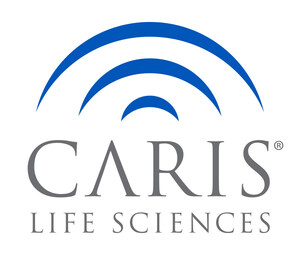Caris Life Sciences Publishes New Data in Clinical Cancer Research Demonstrating 71% Difference in Overall Survival for mCRC Patients Using Its AI-Based MI FOLFOXai Predictor
Caris' AI-powered predictor helps gauge which metastatic colorectal cancer patients will benefit from treatment with current standard of care regimen
Exploratory analyses also found benefit in advanced esophageal/gastro-esophageal junction cancers and pancreatic ductal adenocarcinoma
IRVING, Texas, Dec. 8, 2020 /PRNewswire/ -- Caris Life Sciences®, a leading innovator in molecular science and artificial intelligence focused on fulfilling the promise of precision medicine, today announced positive results from validation studies of MI FOLFOXai™, the company's Artificial Intelligence (AI)-based predictor intended to gauge a metastatic colorectal cancer (mCRC) patient's likelihood of benefit from first-line treatment FOLFOX followed by FOLFIRI versus FOLFIRI followed by FOLFOX, both standard of care options. The studies demonstrated that the overall survival (OS) of patients treated in a manner consistent with the FOLFOXai prediction was 17 months longer than the OS of patients treated counter to the prediction. FOLFOXai is the first clinically validated machine-learning powered molecular predictor of chemotherapy efficacy in patients with mCRC. The results were published in Clinical Cancer Research December 8, a journal of the American Association for Cancer Research.
"The clinical application of these findings could have a major impact on how FOLFOX and FOLFIRI are sequenced, both options are recognized standard of care in metastatic disease, for patients," said Heinz-Josef Lenz, M.D., FACP, Associate Director Clinical Science and Co-director of the Center for Cancer Drug Development at USC Norris Comprehensive Cancer Center. "Using this AI predictor, we saw a 71% difference in OS in patients treated with FOLFOX-FOLFIRI in whom we predicted would benefit from FOLFOX-FOLFIRI chemotherapy compared to those predicted to benefit from FOLFIRI-FOLFOX."
Across two independent validation studies, researchers determined a significant difference in OS based on the FOLFOXai-predicted increased benefit or decreased benefit with FOLFOX-FOLFIRI chemotherapy in combination with bevacizumab. A study using real-world evidence demonstrated a median OS of 42 months in patients expected to see an increased benefit compared to 24.5 months in patients expected to see a decreased benefit (Hazard Ratio [HR]=0.466, 95% Confidence Interval [CI]: 0.325-0.670, p<0.0001). Additionally, patients predicted to have a decreased benefit from FOLFOX-FOLFIRI chemotherapy had significantly better outcomes when treated with FOLFIRI-FOLFOX than those predicted to have an increased benefit and vice versa (HR=2.631, 95% CI: 1.041-6.649, p=0.034). Analysis of samples from the TRIBE2 randomized phase-3 study which compared standard chemotherapy with FOLFOX followed by FOLFIRI to the FOLFOXIRI combination, confirmed the ability of FOLFOXai to predict OS for both study arms.
"These studies validate the potential role of FOLFOXai to improve overall survival in patients with metastatic colorectal cancer who receive first-line standard of care options in the optimal order," said Alan P. Venook, M.D., FASCO, The Madden Family Distinguished Professor of Medical Oncology and Translational Research and Shorenstein Associate Director, Program Development, UCSF Helen Diller Family Comprehensive Cancer Center.
In addition to mCRC, exploratory analyses also found that FOLFOXai predicted a treatment benefit from oxaliplatin-containing regimens in patients with advanced esophageal/gastro-esophageal junction cancers (EC/GEJC) and pancreatic ductal adenocarcinoma (PDAC). These analyses demonstrated FOLFOXai was predictive of OS, with a median OS difference of 10.1 months in the increased benefit cohort compared to decreased benefit (21.4 months versus 11.3 months; HR=0.478, CI: 0.289 – 0.792, p=0.003) but not the nab-paclitaxel/gemcitabine cohort (median OS of 10.8 months for increased benefit versus 9.8 months for decreased benefit; HR=0.958, CI: 0.658 – 1.395, p=0.823). Similarly, data from 104 patients with advanced EC/GEJC demonstrated that FOLFOXai was predictive of efficacy of oxaliplatin containing regimens also in this clinical setting (median OS for increased benefit: 14 months versus 8.9 months for decreased benefit; HR=0.437, CI: 0.250 – 0.763, p=0.003).
"The results of these analyses demonstrate that precision medicine powered by AI has the potential to change how clinicians approach treatment for metastatic colorectal cancer and other cancers, given the selection of initial therapy has implications for improved treatment outcomes and disease progression," said W. Michael Korn, M.D., Chief Medical Officer at Caris Life Sciences. "Based on the results of this study, FOLFOXai should be considered as part of the initial therapeutic decision-making process in the clinical setting."
"Cancer is a complex genetic disease that results from perturbations in cell's signaling pathways that make it virtually impossible for humans to interpret. Application of AI to truly comprehensive genomic profiling and outcome data of these systems has allowed us to make clinically impactful insights and improve patient care. Using our database of over 215,000 profiles and outcomes, we have begun to deconvolute the drivers of therapy resistance and tailor treatment strategies to each individual patient. This is one of many benefits patients receive automatically when they get profiled by Caris, as this is additional clinical insight from an already covered diagnostic test," said David Spetzler, M.S., MBA, Ph.D., President and Chief Scientific Officer at Caris Life Sciences.
"Application of AI to molecular data sets involves overcoming some significant computational challenges. The molecular data generated by MI Profile™ provides hundreds of thousands of data points per patient that had to be analyzed to derive a robust and generalizable set of features and algorithms," said Jim Abraham, Ph.D., Chief Data Officer at Caris Life Sciences. "We were able to deploy 318 different machine learning algorithms to solve these problems and validate the results in blinded, well controlled studies, and this is the first of many AI signatures to come."
Colorectal cancer is the third most common cancer globally, with more than 1.8 million patients diagnosed with the disease each year i. As many as 25% of colorectal cancer patients will present with Stage IV – or metastatic – disease, where the cancer has spread to other parts of the body, making the choice of treatment critical to the patient's prognosis.
About Caris Life Sciences
Caris Life Sciences® is a leading innovator in molecular science and artificial intelligence focused on fulfilling the promise of precision medicine through quality and innovation. The company's suite of market-leading molecular profiling offerings assesses DNA, RNA and proteins to reveal a molecular blueprint that helps physicians and cancer patients make more precise and personalized treatment decisions. MI Exome™ whole exome sequencing with 22,000 DNA genes, and MI Transcriptome™ whole transcriptome sequencing with 22,000 RNA genes along with cancer-related pathogens, bacteria, viruses and fungi analysis run on every patient provides the most comprehensive and clinically relevant DNA and RNA profiling available on the market.
Caris is also advancing precision medicine with Caris MAI™ (Molecular Artificial Intelligence) that combines its innovative service offerings, Caris Molecular Intelligence® with its proprietary artificial intelligence analytics engine, DEAN™, to analyze the whole exome, whole transcriptome and complete cancer proteome. This information, coupled with mature clinical outcomes on thousands of patients, provides unmatched molecular solutions for patients, physicians, payers and biopharmaceutical organizations.
Caris Pharmatech is changing the paradigm and streamlines the clinical trial process by assisting biopharma companies with accessing research-ready oncology sites for clinical trials. With over 200 research sites within the Caris Pharmatech Just-In-Time (JIT) Oncology Network, biopharma companies can identify and enroll more patients, faster. Caris Pharmatech Just-In-Time Clinical Trial Solutions focus on rapid site activation and patient enrollment to streamline the drug development process. By implementing Caris' Just-In-Time Trial-Matching System, Caris will automatically match patients to clinical trials and sites can be activated and eligible to enroll patients within one week.
Headquartered in Irving, Texas, Caris Life Sciences has offices in Phoenix, Denver, New York, and Basel, Switzerland. Caris provides services throughout the U.S., Europe, Asia and other international markets. To learn more, please visit www.CarisLifeSciences.com or follow us on Twitter (@CarisLS).
Caris Life Sciences Media & Company Contact:
Lindsey Bailys
GCI Health
[email protected]
212-798-9884
i World Cancer Research Fund. Colorectal cancer statistics. March 2020. Available at https://www.wcrf.org/dietandcancer/cancer-trends/colorectal-cancer-statistics.
SOURCE Caris Life Sciences

Related Links
http://www.carislifesciences.com
WANT YOUR COMPANY'S NEWS FEATURED ON PRNEWSWIRE.COM?
Newsrooms &
Influencers
Digital Media
Outlets
Journalists
Opted In






Share this article